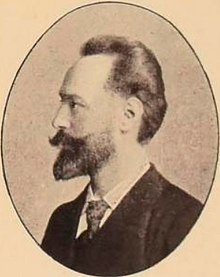Anton Hekking
Anton Hekking (born September 7, 1856 in The Hague , † November 18, 1935 in Berlin ) was a Dutch cellist .
Life
He came from a well-known family of musicians, which also included the French cellists André Hekking (brother) and Gérard Hekking (cousin). Already with 17 years he was principal cellist of the Symphony Orchestra of Utrecht , to then join the Pawlowski Orchestra in Russia. He then studied from 1873 to 1878 at the Conservatoire de Paris with Léon Jacquard and Pierre Chevillard, where he won a first prize.
This was followed by his first tour in the USA, where he performed with the Russian pianist Anna Essipova , among others . After returning to Europe, he joined the Bilse Kapelle in Berlin in 1880 and became one of the co-founders of the Berlin Philharmonic in May 1882 . He left this orchestra a short time later to go on a concert tour through Europe with the Belgian violinist and composer Eugène Ysaÿe . From 1884 to 1888 he belonged again with interruptions to the Berlin Philharmonic, and from 1889 to 1891 he was first cellist in the Boston Symphony Orchestra and from 1895 to 1898 in the New York Philharmonic Orchestra . During this time he gave numerous solo concerts in the USA and Europe. From 1894 to 1897, among others, in Germany with the pianist Martha Remmert and Waldemar Meyer in a trio at numerous very successful Beethoven evenings.
From 1902 to 1907 he formed the first "Hekking Trio" with the American pianist Artur Schnabel and the Polish violinist Alfred Wittenberg , which initiated the founding of the Schubert Hall in Berlin. After Arthur Schnabel left, he continued the Hekking Trio with Wittenberg and the American pianist Clarence Adler from 1907 to 1909, which enjoyed great success in the USA. During this time he also taught at the Stern Conservatory in Berlin, which is now affiliated with the University of the Arts .
Hekking played the cello in a romantic style with an impressive vibrato. A 1911 recording of Elégie by Jules Massenet , which testifies to this, is on the sampler The Recorded Cello, Volume II by Pearl.
Works (selection)
- Evening song by Schumann, Stradivari Record G 85
- Meditation , Ave Maria von Bach, Continental 535
- Chanson triste by Tschaikowsky, Continental 535
- Dreaming of Schumann, Pathé 54161
- Chanson triste by Tchaikovsky, Kalliope K 535
- Berceuse from Godard, Calliope K 241
swell
- Variations with Orchestra, 125 Years of the Berlin Philharmonic, The Recorded Cello, Vol.II
Individual evidence
| personal data | |
|---|---|
| SURNAME | Hekking, Anton |
| ALTERNATIVE NAMES | Hekking, Antoine |
| BRIEF DESCRIPTION | Dutch cellist |
| DATE OF BIRTH | September 7, 1856 |
| PLACE OF BIRTH | The hague |
| DATE OF DEATH | November 18, 1935 |
| Place of death | Berlin |
